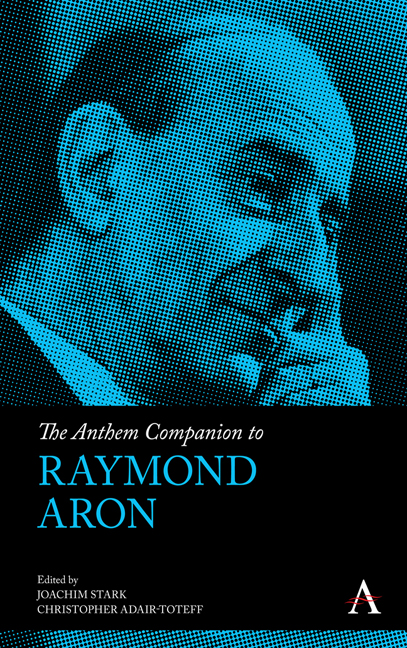Book contents
- Frontmatter
- Contents
- Acknowledgements
- Introduction: Retracing Aron’s Routes to Sociology
- Chapter One The Subject, Pluralism and Équité: Raymond Aron and Sociology
- Chapter Two Aron, Weber and Nationalism
- Chapter Three Equivocal and Inexhaustible: Aron, Marx and Marxism
- Chapter Four The Opium of the Intellectuals
- Chapter Five A New Era in the Human Adventure: Industrial Society and Economic Growth
- Chapter Six Raymond Aron: La lutte de classes
- Chapter Seven Political Philosophy Meets Political Sociology: Raymond Aron on Democracy and Totalitarianism
- Chapter Eight The Contradictions of Prometheus: Wisdom and Action after the Disillusionment of Progress
- Chapter Nine The International Problem and the Question of the Best Political Regime
- Chapter Ten War and Irrationality: Aron and Pareto
- Conclusion: Aron on Liberty
- Notes on Contributors
- Index
Chapter Six - Raymond Aron: La lutte de classes
Published online by Cambridge University Press: 22 February 2022
- Frontmatter
- Contents
- Acknowledgements
- Introduction: Retracing Aron’s Routes to Sociology
- Chapter One The Subject, Pluralism and Équité: Raymond Aron and Sociology
- Chapter Two Aron, Weber and Nationalism
- Chapter Three Equivocal and Inexhaustible: Aron, Marx and Marxism
- Chapter Four The Opium of the Intellectuals
- Chapter Five A New Era in the Human Adventure: Industrial Society and Economic Growth
- Chapter Six Raymond Aron: La lutte de classes
- Chapter Seven Political Philosophy Meets Political Sociology: Raymond Aron on Democracy and Totalitarianism
- Chapter Eight The Contradictions of Prometheus: Wisdom and Action after the Disillusionment of Progress
- Chapter Nine The International Problem and the Question of the Best Political Regime
- Chapter Ten War and Irrationality: Aron and Pareto
- Conclusion: Aron on Liberty
- Notes on Contributors
- Index
Summary
Among the volumes that make up Aron's trilogy on ‘industrial society’, which were the result of a series of courses held at the Sorbonne between 1955 and 1958 and were conceived as parts of one research project, La lutte de classes. Nouvelles leçons sur les sociétés industrielles – published in France in 1964 and soon translated into German, Spanish, Catalan and Italian (Aron 1964) – is the least known among readers and the least quoted by scholars. Yet, Aron himself, when he mentions it briefly in his Mémoires in 1983, describes this course (the second of the four dedicated to the comparison between the economic systems, social structures and political regimes of the Western world and communist Europe, and more generally to the transformations in the industrial and productive sphere of the post-war period) as ‘the best of the three from a scientific point of view’ (Aron 1984, 408).
This judgement is still valid given that, as we will see, this book is not only an exercise in academic sociology with an empirical-descriptive angle – in 1955 Aron started academic teaching after a long break as political commentator and independent researcher (Baverez 1993, 289–91) – but also a short essay of political theory: it moves from an analysis of the different modalities of class struggle and social conflicts in Western societies and Soviet ones to a reformulation of the classical doctrine on political class and power élites and, furthermore, to a critique of the Soviet political-economic model. This critique was carried out not without irony and in an intellectually paradoxical manner, through the recourse to typically Marxist concepts and interpretative schemes.
The central thesis of the book is that the regimes that arose from Marxist–Leninist revolutions, despite their claim of having abolished class conflict and established the political rule of the masses, represent, much more than liberal democracies and capitalist countries, the best historical exemplification of the intrinsically oligarchic character of power and the decisive role that organized minorities – political, economic, technical – hold within any organized social system.
- Type
- Chapter
- Information
- The Anthem Companion to Raymond Aron , pp. 105 - 118Publisher: Anthem PressPrint publication year: 2021

